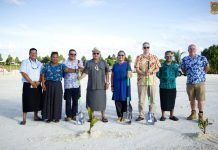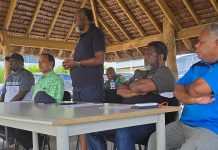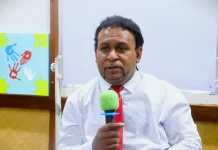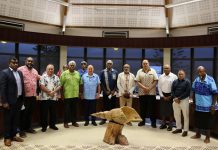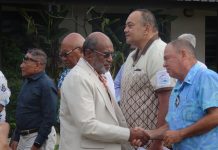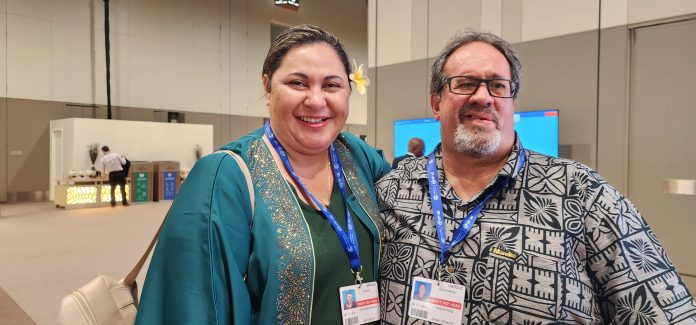
By Pita Ligaiula at COP28 in Dubai, UAE
As the conclusion of COP28 in Dubai draws near, Wayne King, the chief climate negotiator for the Cook Islands, provided an overview on Monday of the ongoing state of the negotiations.
King spoke about the UAE version of Talanoa—the ‘Majilis’ with all Ministers and heads of delegation.
The discussions focus around the key outcomes expected from COP28, with strong support for the phase-out of fossil fuels and increased financing for both adaptation and climate initiatives.
“There’s a lot of support for the phase-out of fossil fuel.
“There was active and vocal support for the increase of adaptation financing and climate financing,” said the Cook Islands chief negotiator.
He emphasised a collective approach on the negotiation process.
“There is a view together this will work, ‘not them and us approach.’”
King said a departure from the usual process, with co-facilitators updating the President on unresolved issues, raising hope for a timely conclusion.
“The process is not quite the same as previously. The co-facilitators, Ministers dealing with complex and undecided issues, will feed the President their state of play. From there, the COP president is going to reach out in the next 24 to 48 and hammer out agreements.”
The Chief negotiator acknowledged the approach of the COP President, who actively engages oil-producing governments, stressing the need for fossil fuel phase-out.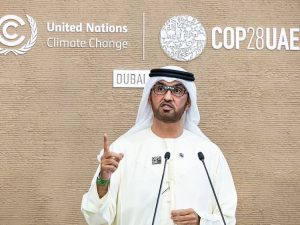
“I like the way he’s bringing in oil companies, those governments that produce a lot of oil, including his own, to the table. The determination to say the fossil fuel for some time needs to completely disappear off the table,” he said.
King expressed uncertainty about the President’s intentions but acknowledged the positive aspect of bridging gaps.
Regarding ongoing discussions, King said that the global goal on Adaptation and the Global Stocktake (GST) remained sticking points.
He also said there is divergence in views on fossil fuel phase-out, with some advocating for a gradual approach due to economic concerns.
“We are really on the same group, primarily from the developing producing countries. It’s a tricky one, very complicated. We all use cars; we all travel on planes. I mean, 100,000 people came here on aircraft, which is crazy. So just to give you a sense, there is quite a strong divergence of view around the thinking of fossil fuel phasing.”
Addressing the Global Stocktake (GST), King explained the opposing views, particularly between Small Island Developing States (SIDS) and other nations.
SIDS, including the Cook Islands, call for a complete phase-out, while others sight economic implications and support for a more gradual transition.
“SIDS, along with other nations, advocate for a complete phase-out of fossil fuels, rejecting the idea of a gradual phase-down. Some argue against this approach, stating it’s not as simple as flipping a switch. Concerns revolve around potential economic repercussions for nations heavily reliant on fossil fuels, emphasisng the need for continued financial and technical support during the transition,” said King.
King admitted the challenge of finding compromises and the need for effective monitoring post-Paris Agreement.
He expressed hope for a positive outcome, particularly regarding Loss and Damage (LND) funding,shared among all developing countries.
Maintaining a Pacific perspective, King highlighted Australia’s commitment to transition away from fossil fuels, aligning with Pacific Islands Forum goals.
He stressed the Pacific’s unwavering stance on keeping the 1.5-degree target alive, even if wording adjustments were accepted.
“At our context, we could accept some form of language that does not degrade keeping 1.5 alive. Phasing out fossil fuel may be worded like transitioning away, which actually means we’ve got to really play with concepts and words that do not erode fossil fuel phase out. It’s a little bit technical in nature; it’s not a dictionary exercise.
“We are sticking to our line, but there is a move out there to try to say phasing out fossil fuel but not using the word phasing out. Pacific Islands, AOSIS, SIDS, we are stuck on our line and we are not moving; that’s our red line.
“There is optimism around how we get around this, and we are going to come down with some words. That’s why we are cautious and what we are looking at,” said King at the media interview in Dubai.
On climate finance, King clarified that clarity was lacking globally.
“We are not clear across the board globally what climate finance is. So in terms of finance, there are some key areas now being cleared for conclusion,” he said.
He talked about progress on the collective quantified goal of US$100 billion, with expectations of increased funding in the coming years.
“The new one is the collective quantified goals, which the $100 billion, according to our friends in the developed world, is already met last year, but no proof of that. Instead of US$100 billion, what is the new number coming in the next two to three years? Everyone believes it’s going to be hundreds of billions, if not a trillion,” King said.
King also spoke on agreements on guidance for the Green Climate Fund (GCF), including a shift towards long-term projects.
“We’ve got a programme going to start next year where all of us will start on transition next year according to the plan we got.
“The other one is the guidance to the Green Climate Fund. We had specific asks in that, and all that went through and cleared.
“The last point on the guidance for GCF was that we want a regional presence, especially for PSIDS. We aim for an office within our region, seeking delegated authority so that we can submit proposals for approval locally, rather than having to go to Korea and wait for a response. Those requests were cleared, and everyone agreed,” said King.
The COP28 President’s pledge to conclude by 11 am on Tuesday a departure from the conventional UN system, creating an atmosphere of expectation among negotiators for the imminent release of the final outcomes.
SOURCE:PACNEWS






